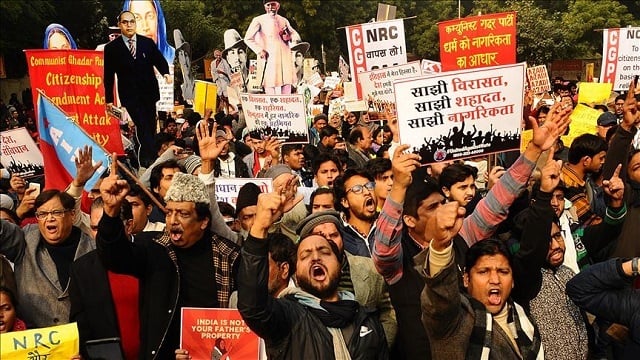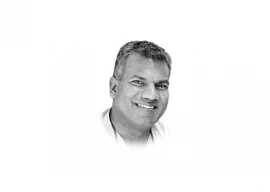
The violence had erupted in the district against the new citizenship law, seen discriminatory against Muslims.
The district located to the east of River Ganges and in the foothills of Himalayas houses 43.94% Muslim population, according to the census conducted in 2011.
Anas, 21, and Mohammed Suleiman, 20, were allegedly shot at by the police in Nehtaur, a city in the district. Muslims make up 70% of the population in Nehtaur.
On December 20, a large number of people took to the streets against the citizenship law in many places in India. Both the youth were killed after Friday prayers when people had gathered to protest against the contentious Citizenship Act, said Suleiman's mother Akbari Khatoon.
She said Suleiman was preparing to crack the civil services examination, one of the toughest qualifying tests to seek entry into the top Indian bureaucracy. It is a dream for every student in India to crack this test.
“He would spend day and night just studying, preparing for the test. They killed my wonderful, hard-working son,” she said.
Suleiman's family says that he had gone to the mosque to offer prayers. “He was in no way part of protests. He was shot as soon as he was coming out of the mosque,” said his mother.
Indian court turns down petition to stop implementation of citizenship law
Suleiman's brother Shoaib has complained that six policemen, including Nehtaur’s former police station, in-charge Rajesh Solanki, sub-inspector Ashish Tomar, and constable Mohit Tomar, were responsible for killing his brother.
The region where the majority of Muslims are reeling under poverty, coupled with social and educational backwardness, Suleiman’s dream to qualify the civil service test was being lauded by relatives and neighbours. Two leading 16th-century scholars of the Mughal empire Abul Fazal and Faizi are believed to have been born and studied in the district.
Case registered against policemen
Additional Superintendent of Police (Rural) Vishwajit Srivastava told Anadolu Agency that a complaint had been received against the police personnel and a case has been registered.
Family members of Anas, another youngster killed on that day, claim that he had gone out to buy milk when he was shot. His son is just 7 months old. There is an atmosphere of grief in the family.
To add insult to injury, both families were not allowed to bury the dead in the town. “We had to take bodies to a faraway graveyard, as the administration did not allow to bury bodies nearby. Their last rites were conducted 20 km away, “said Arshad Hussain, father of Anas.
Defending the act, Bijnor District Magistrate Ramakant Pandey said, the step was taken to avoid the situation to deteriorate further.
An Uttar Pradesh minister, who visited the city refused to meet the families Suleiman and Anas, terming them "upadravi" (vandals).
Kapil Dev Agarwal, the minister for vocational education and skill development, however, visited Om Raj Saini, a Hindu, who was injured in the violence.
The main opposition Congress leader Priyanka Gandhi Vadra met the families of dead and demanded a judicial inquiry into the conduct of police officers. In a 14-page memorandum to Governor Anandiben Patel, the Congress party said the conduct of the police had been observed and reported to be "patently unlawful, destructive of the rule of law and repressive of honest citizens".
1724152318-0/beyonce-(1)1724152318-0-405x300.webp)
1728213758-0/Tribune-Pic-(2)1728213758-0-165x106.webp)


1727594410-0/diddy-(1)1727594410-0-165x106.webp)




1728193999-0/Untitled-design-(18)1728193999-0-270x192.webp)
1728206666-0/Untitled-design-(20)1728206666-0-270x192.webp)






COMMENTS
Comments are moderated and generally will be posted if they are on-topic and not abusive.
For more information, please see our Comments FAQ